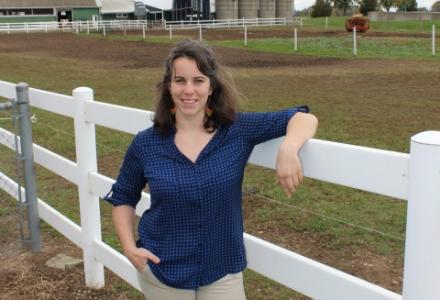 |
Abigail CarpenterPosition/Title: Assistant Professor email: acarpenter@uoguelph.ca Phone: 519-674-1500 x63541 Office: Ridgetown |
Gail developed an interest in science from her father, who was a high school biology teacher, and from watching the TV show Bill Nye the Science Guy. As an academic, she decided to focus on livestock nutrition because everything that lives on a farm depends on it. Gail studies applied dairy nutrition management, looking at sustainable feeding strategies for dairy cows. Her research involves in vitro rumen fermentation and on-farm studies. Following a postdoctoral position in the Department of Animal Sciences and Industry at Kansas State University, Gail joined the University of Guelph’s Ridgetown Campus, where she teaches dairy production.
Academic History
- B.Sc. in Animal Science, Agribusiness Management, Michigan State University (2010)
- M.Sc. in Animal Science, Ruminant Nutrition, University of Minnesota (2012)
- Ph.D. in Animal Science and Industry, Ruminant Nutrition, Kansas State University (2015)
Affiliations and Partnerships
- Canadian Society of Animal Science (2017 - present)
- American Dairy Science Association (2011 - present)
Honours and Awards
- Midwest Young Dairy Scholar, American Dairy Science Association (2016)
- Graduate Student Council Travel Award, Kansas State University (2014)
Research Impact
Gail’s applied research has direct implications for industry through improving nutrition, production and sustainability on farms. Using biomass instead of human food to feed dairy cows is more sustainable and reduces feed costs while maintaining milk production. Boosting milk production can help make farms more profitable and meet growing consumer demand for milk and dairy products. For her Ph.D. thesis, Gail found that giving non-steroidal anti-inflammatory drugs to dairy cows after they calve can increase milk production for the duration of their lactation. The gender of the calf also affects the mother cow’s milk production. Lactation records from the U.S. show that dairy cows produce more milk after giving birth to a heifer compared to a bull.
Current Research Projects
Feeding biomass to dairy cows
Gail aims to develop sustainable feeding practices for livestock by examining the environmental and economic impact of using byproduct feeds in dairy rations. As the global population approaches nine billion, farmers are being pressured to stop feeding human food to livestock, one of the biggest criticisms facing producers. Biomass feed, such as distillers’ grains, which is unsuitable for human consumption, is an alternate food source for livestock that provides high-quality energy and nutrition. Gail is using live cow studies and in vitro models to collect rumen fluids and screen feeds to test their effects on fermentation.
Feeding switchgrass to dairy cows
In 2017, Gail received funding to study the use of switchgrass in Ontario dairy rations. Her study focuses on lactating cows in Elora, Ont. Some farmers already feed switchgrass instead of straw to their cows. Switchgrass is a good source of fibre, but different harvest times can affect its nutritional content. Once the plant begins to seed, it becomes less appetizing to cows and its nutritional value drops. Native to North America, switchgrass is easy to grow on land with poor soil and low moisture. This project is funded by the Ontario Ministry of Food, Agriculture and Rural Affairs (OMAFRA) – University of Guelph Partnership.
Graduate Student Information
Since joining Ridgetown Campus in 2016, Gail looks forward to working with her first group of graduate students in fall 2017. She wants to encourage them to become independent researchers and give them the freedom to pursue their interests. As a graduate supervisor, Gail describes herself as patient, approachable and always willing to help her students. During her graduate studies, she gained extensive experience working with students as a teaching assistant, lab assistant and dairy judging coach.
Featured Publications
- Carpenter, A. J., C. M. Ylioja, L. K. Mamedova, K. Olagaray, and B. J. Bradford. 2017. “Effects of early postpartum sodium salicylate treatment on long-term milk, intake, and blood parameters of dairy cows.” J Dairy Sci (submitted for review).
- Carpenter, A. J., E. Binversie, M. Ruiz-Moreno, and M. D. Stern. 2017. “Effect of dried fermentation biomass on microbial fermentation in continuous culture and in vitro intestinal digestibility.” Anim Feed Sci Tech (in press).
- Carpenter, A. J., C. F. Vargas-Rodriguez, J. A. B. Jantz, and B. J. Bradford. 2017. “Short communication: Sodium salicylate negatively impacts rumen fermentation in vitro and in situ.” J Dairy Sci 100: 1935- 1939. Binversie, E. Y., M. Ruiz-Moreno, A. J.
- Carpenter, B. J. Heins, G. I. Crawford, A. DiCostanzo, and M. D. Stern. 2016. “Effects of dietary roughage and sulfur in diets containing corn dried distillers grains with solubles on hydrogen sulfide production and fermentation by rumen microbes in vitro.” J Anim Sci 94: 3883-3893. Razzaghi, A., R. Valizadeh, A. A. Naserian, M. Danesh-Mesgaran, A. J.
- Carpenter, and M. H. Ghaffari. 2016. “Effect of dietary sugar concentration and sunflower seed supplementation on lactation performance, ruminal fermentation, milk fatty acid profile, and blood metabolites of dairy cows.” J Dairy Sci 99: 3539-3548.